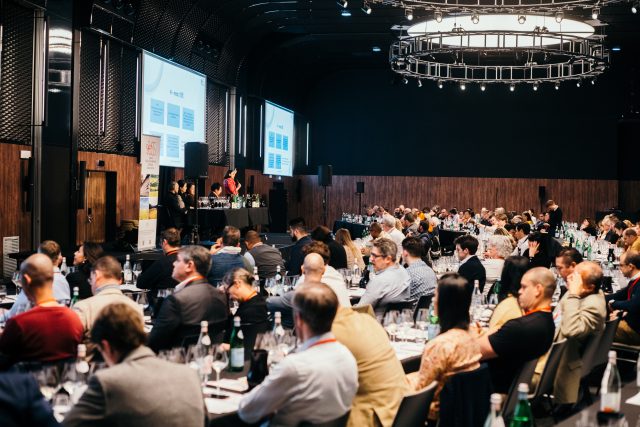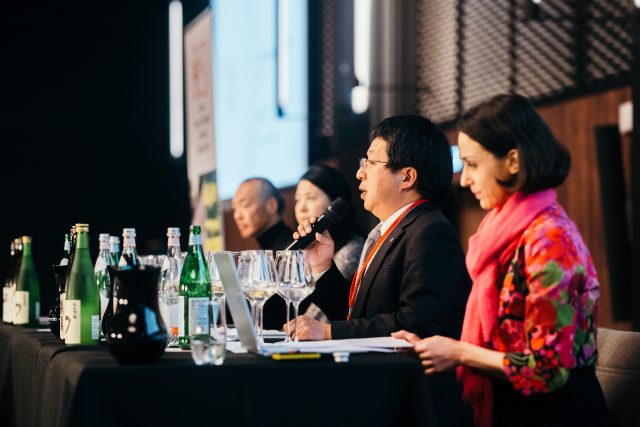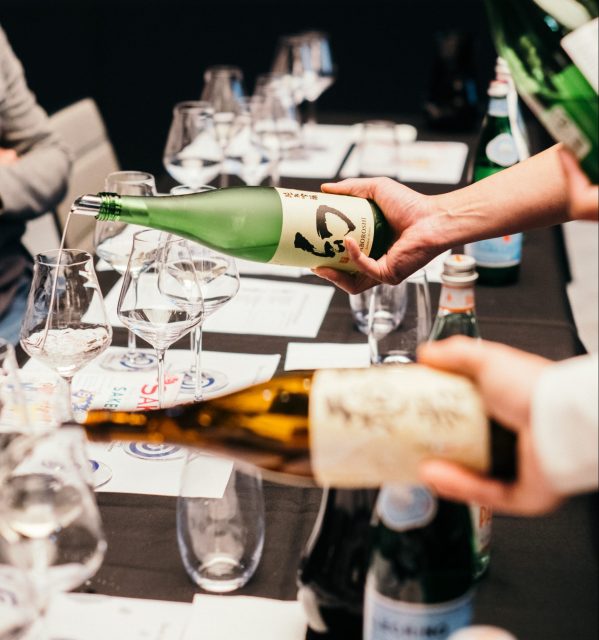This website uses cookies so that we can provide you with the best user experience possible. Cookie information is stored in your browser and performs functions such as recognising you when you return to our website and helping our team to understand which sections of the website you find most interesting and useful.
JSS and ASI partnership: sommeliers show strong support for sake
Though the European market for sake is currently small, a new generation of sommeliers is championing the Japanese beverage as an alternative to wine, thanks to a partnership between the Japan Sake and Shochu Makers Association (JSS) and Association de la Sommellerie Internationale (ASI).

In fiscal year 2022, sake export results reached a record high for the 13th consecutive year, reaching approximately ¥47.5 billion with shipments to 72 countries and regions. By region, Asia accounted for about 65% of total sales and North America for 25%, reaching 90% of total sales. The sake industry has been expanding export while accumulating their own expertise with learning from the wine industry, due to its similarity in aroma, taste, and alcohol content. But its presence in Europe is the decisive difference from that of wine in terms of consumption level: sake exports to Europe currently account for only 6% of the total value of exports.
According to an IWSR study, five of the top 10 wine consuming countries in the world in 2021 were in Europe, with the top three – the UK, France, and Italy – alone accounting for about 30% of the global total. Although the difference in consumption of sake and wine cannot be simply compared, it is the industry’s long-held wish to increase awareness of sake in Europe and to expand the number of users.
One of the main obstacles to the proper recognition and expansion of the user base in Europe is the misconception that sake is a spirit. This misconception has been spread by the fact that some restaurants in Europe have been serving spirits under the name ‘sake’, and a survey conducted by Wine Intelligence within the National Tax Agency’s project to promote the branding of Japanese alcoholic beverages in January 2021 found that 80% of French alcohol users were aware of sake, but more than one-third of them answered that the alcohol content was 30% or higher. This means almost a quarter of French alcohol users regard sake as a spirit.
This misconception was well-known among sake producers even before the survey, and was one of the root causes of the lack of interest in sake in the European market. One of the objectives of the JSS, an organization of which most of the producers of sake and shochu are members, is to make sake as a world-class alcohol category and to promote a proper understanding of sake in order to spread its appeal throughout the world. In order to gain global recognition that sake is a sophisticated beverage with a long history, which is made from rice but can be enjoyed with food pairings, like wine, the JSS aims to spread the correct understanding of sake through sommeliers.

In 2020, it concluded a partnership with the Union de la Sommellerie Française (UDSF) and started providing information on sake to its sommeliers on a regular basis. And in 2022, they also signed a partnership with the ASI.
In September 2022, JSS participated in the ASI Bootcamp in Malaysia, an educational programme for young sommeliers held in Kuala Lumpur, and conveyed the appeal of sake to the next generation of drinks experts. In addition, they also participated in this year’s Best Sommelier of the world, held in Paris from 7 to 12 February, as a partner in the ASI, the competition of the Best Sommelier of the world held every three years. Approximately 70 participants, including three winners of continental competitions, such as Europe and Africa, Asia and Oceania and North and South America, took part in the competition.
Since sommeliers and restaurateurs from all over the world come to watch the competition in person and online, the master classes are the most suitable and attractive venue for JSS to transfer correct knowledge. The JSS also hosted a masterclass on the afternoon of 11 February, where French sommelier and educator Julia Scavo presented “A brief history of the acidity with sake”. In the masterclass, she mentioned that sake, with a total acidity only a fifth of that of wine, requires greater cleanliness in the production process and handling care in distribution. She also explained how sake has developed a natural system to protect it from contamination and spoilage during production, focusing on the scientific aspects of four different starters, called moto, such as Bodai-moto, Ki-moto, Yamahai-moto, and Sokujo-moto, in addition to their histories. She said that the nitrate-reducing bacteria in the brewing water reduce nitric acid in the water to nitrous acid, and then two types of lactic acid bacteria produce lactic acid to prevent contamination by wild yeast and other bacteria.

In the masterclass, five types of sake produced from four different styles of moto(starter) were tasted, and the fact that sake has five times more umami than wine, was mentioned. Additionally, it was highlighted that the higher level of Umami is a good match for cheese and warmed up sake can bring even more interesting pairings.
The master class of the day can be viewed below:
JSS director Hitoshi Utsunomiya, who was in attendance, is convinced that sake is becoming more a recognized alcohol category globally, as the more than 200 top sommeliers from around the world who participated in the event showed a serious desire to gain knowledge about sake. “We hope to deliver sake of excellent quality that meets their expectations,” he commented.
Raimonds Tomsons, the Latvian sommelier who won the ASI Best Sommelier of the world on February 12, has a long relationship with JSS. He has a deep knowledge of sake and has been actively involved in the sake education programs. There are high expectations in the sake industry that Tomsons, the World’s Best Sommelier 2023, will continue to be an evangelist for the appeal of sake.
There is no shortage of sommeliers in the wine industry rushing to learn more about sake. In fact, sake-related questions were asked during this competition. 2022 sake exports to Europe were 1.8 times higher than in 2019 before the Covid-19, and France is growing at a similar rate. But the partnership between the JSS, the French Sommelier Association, and ASI will be a crucial bridge not only to expand the correct awareness of sake in the European market, but also to convey the appeal of sake to the world’s gastronomy.
To discover more about JSS, click here.
Related news
UNESCO recognises Japanese sake-making with koji mold

